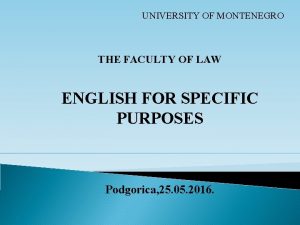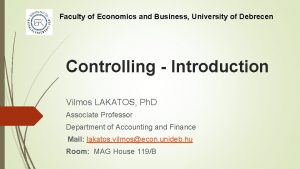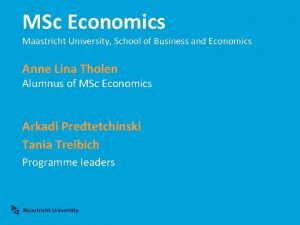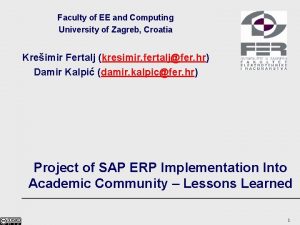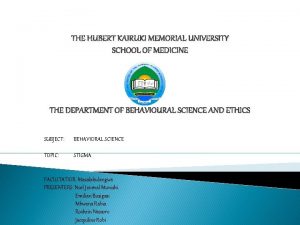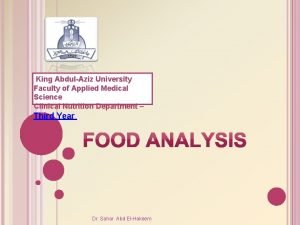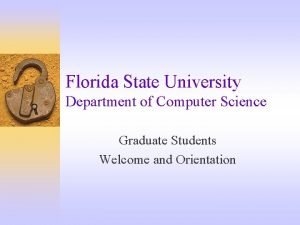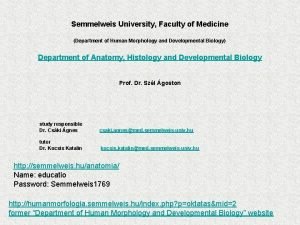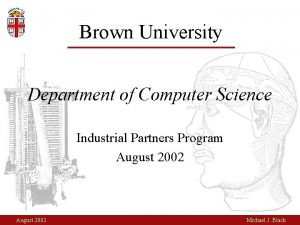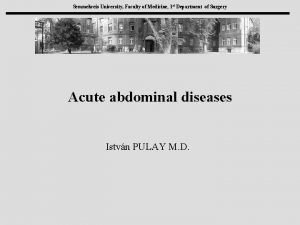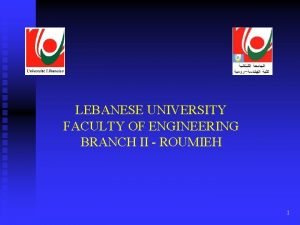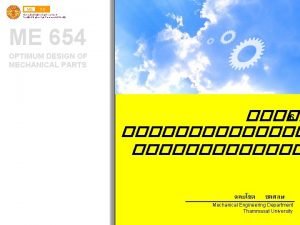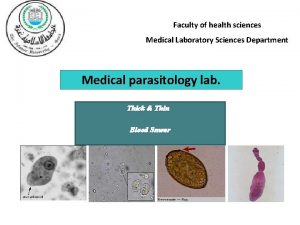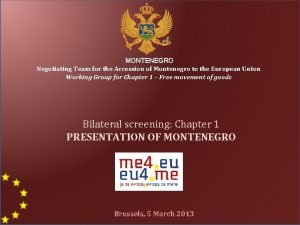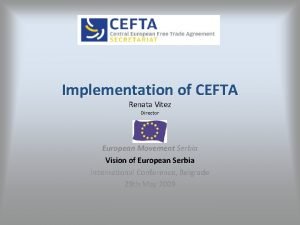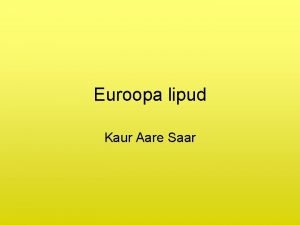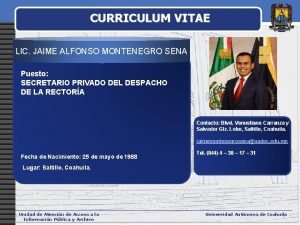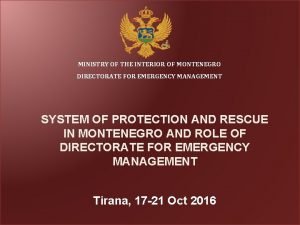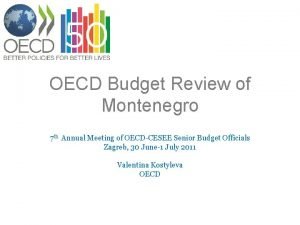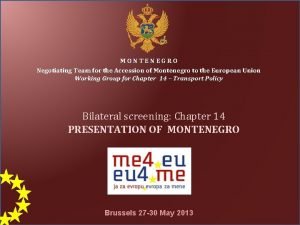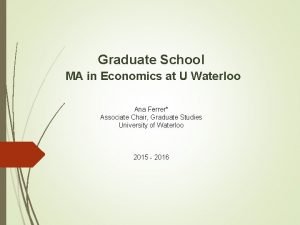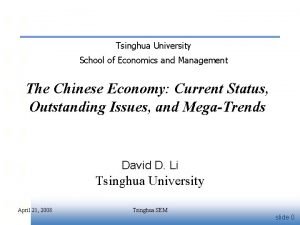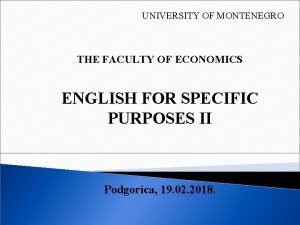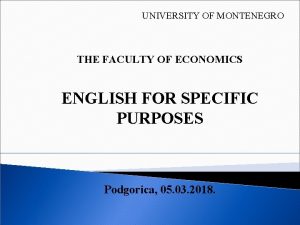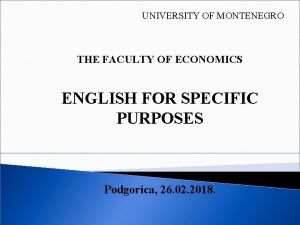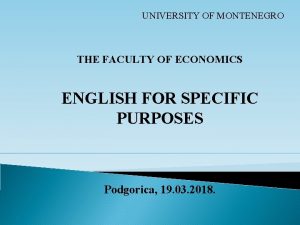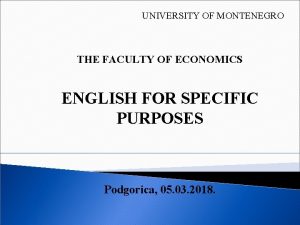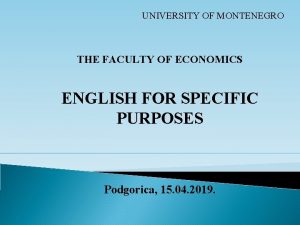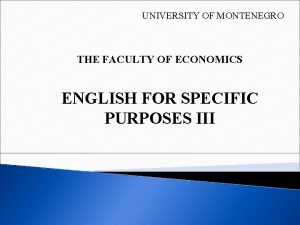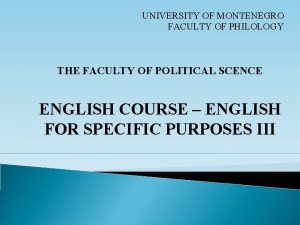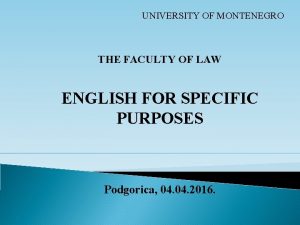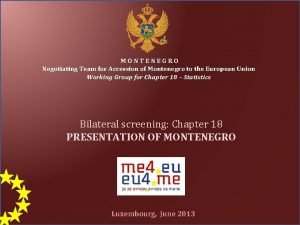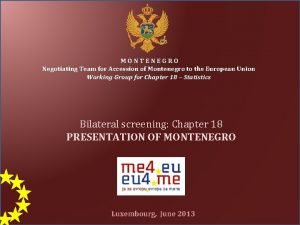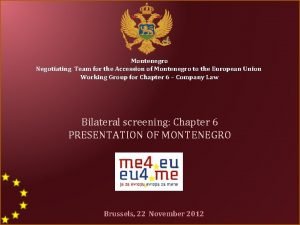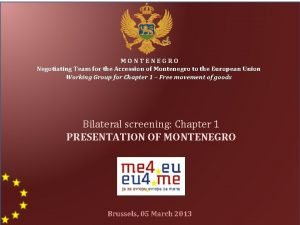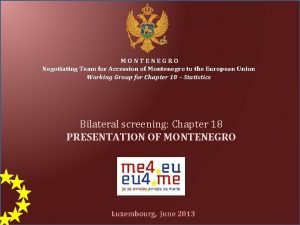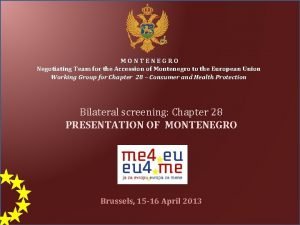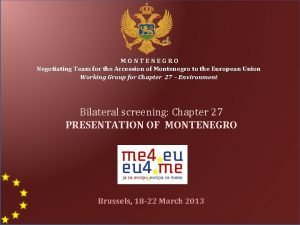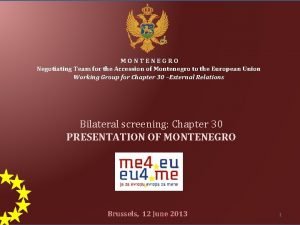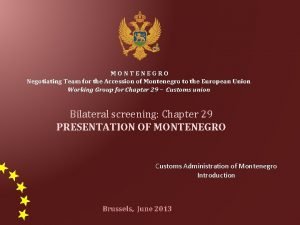UNIVERSITY OF MONTENEGRO THE FACULTY OF ECONOMICS ENGLISH





























































- Slides: 61

UNIVERSITY OF MONTENEGRO THE FACULTY OF ECONOMICS ENGLISH FOR SPECIFIC PURPOSES Podgorica, 15. 04. 2019.

FINAL TEST PREPARATION

CONDITIONAL CLAUSES



FIRST CONDITIONAL If the weather is nice, we will go for a walk. If you don’t apologize, she will never trust you again. If clause: Main clause: PRESENT SIMPLE FUTURE SIMPLE The first conditional refers to the present and future. It expresses a possible condition and its probable result in the future.

Translate the following sentences: Ako dođe, pozvaću te. If he comes, I will call you. Ukoliko budem imao vremena, posjetiću ih. If I have time, I will visit them. Kupiću taj brod ako budem imao dovoljno novca. I will buy that boat if I have enough money. Neću Vas uznemiravati ako ste zauzeti. I will not disturb you if you are busy.




GERUND AND INFINITIVE

INFINITIVES ARE THEREFORE DIVIDED INTO: FULL INFINITIVE – TO DO, TO PLAY, TO GO BARE INFINITIVE – DO, PLAY, GO

WE USE BARE INFINITIVE WITHOUT TO: AFTER VERBS MAKE AND LET: SHE MADE ME SIGN THE CONTRACT. THEY MAKE ME GO TO WORK. SHE HAS MADE ME REPAINT THE OFFICE. THEY LET US GO. SHE HAS LET US FILL INJ THE FORM. WE ALSO USE BARE INFINITIVE AFTER ALL MODAL VERBS: CAN, SHOULD, MUST, WILL. . . THEY CAN CALL YOU. WE MUST GO NOW.

WE USE FULL INFINITIVE, WITH TO:


PAY ATTENTION: AFTER ON, IN, AFTER, BY, TO, AT, ABOUT, HOW ABOUT, BEFORE WE USE ING! THEY ARE TALKING ABOUT. . . . (MOVE) MOVING SHE IS GOOD AT. . . . . (SWIM) SWIMMING

PAY SPECIAL ATTENTION: AFTER LOOK FORWARD WE USE TO + VERB + ING SHE LOOKS FORWARD. . . . (HEAR) YOU. TO HEARING THEY LOOK FORWARD. . . . (MEET) US. TO MEETING WE ARE LOOKING FORWARD TO. . . . (VISIT) YOU. TO VISITING

WE ALSO USE V+ING AFTER EXPRESSIONS: TO BE BUSY, IT IS NO USE, WOULD YOU MIND HE IS BUSY PREPARING FOR THE EXAM. IT IS NO USE TRYING. WOULD YOU MIND OPENING THE WINDOW? WOULD YOU MIND DOING THIS EXERCISE?

Complete the Dialogues with either the infinitive or gerund. A: Did you decide ____ (take) the job you were offered? B: Well, at first it really seemed _____ (to be) a good offer, and I considered ____ (take) it. But, ultimately, I decided not _____ (accept) the offer. A: Why not? B: Well, I was worried about _____ (be) forced to travel a lot. The job offer involved a lot of international travel. I am not intereseted in ____ (travel) overseas for weeks at a time. A: I would have accepted the position. I don’t mind ____ (travel) abroad. B: I know. It just wasn’t right for me. I still intend _______ (get) a new job and I hope ____ (find) something by the end of this year.

1. James offered ________ Ben a lift to the airport. (give) 2. Would you mind ________ back in about twenty minutes? I'm in the middle of a meeting. (phone) 3. It's not worth ________ to the meeting now. It's almost over. (go) 4. They arranged ________ at a hotel near the aiport rather than in the city centre. (stay) 5. We've decided ________ some more staff for the summer season. (hire) 6. Nicolette can't help ________ that the project is going to be a complete disaster. (think)

7. Stewart refused ________ the terms of his new contract. (discuss) 8. Do you fancy ________ us for dinner tonight? (join) 9. The company plans ________ twenty new stores across the United States this summer. (open) 10. "Have you managed ________ at the proposal yet? " - "Sorry, I've been really busy. I promise ________ it tonight though. " (look at; read)

PRESENT PERFECT TENSE


How do we make Present Perfect form? Affirmative sentences: Subject Auxiliary Verb I You We They He She It Past Participle have seen has seen

How do we make Present Perfect form? Negative sentences: Subject Auxiliary Verb I You We They He She It Past Participle haven’t (=have not) seen hasn’t (=has not) seen



TIME EXPRESSIONS EVER NEVER SINCE FOR ALREADY JUST YET LATELY RECENTLY THIS IS THE FIRST/SECOND TIME IN THE LAST FEW YEARS THREE TIMES/FOUR TIMES

1. 2. 3. 4. 5. 6. We are happy to inform you that we (establish) a new branch in Australia. Bob Westley (sign ) the contract. We (acquire) a new customer. Alice Wilson (agree) to organise the teams. I (print out / just) the letter. Our customers (be / always) satisfied with our services.

Translate the following sentences: 1. 2. 3. 4. 5. Kupili su kuću. Pročitali su knjigu. Da li si ikada bio u Lisabonu? Upravo su doputovali. Koliko dugo živite ovdje?

THE PAST SIMPLE TENSE Past Simple: When sth happened at a particular/specific moment in the past. Sth that ended in the past. Example sentences: He worked in a factory in 1834 I wrote this letter when I was 16.

How do we form this tense? 1) 2) IF A VERB IS REGULAR WE ADD – ED IF THE VERB IS IRREGULAR WE USE “THE SECOND COLUMN” 3/11/2021 32

PAST SIMPLE Past Simple: HOW? Verb+ed/ 2 nd column Did/didn’t + ? - I worked Did I work? I didn’t work You worked Did you work? You didn’t work He worked Did he work? He didn’t work She worked Did she work? She didn’t work It worked Did it work? It didn’t work Did we work? We didn’t work Did you work? You didn’t work Did they work? They didn’t work DID/DIDN’TWe worked You worked folowed by: They worked infinitive

The affirmative form I went to school five minutes ago. She swept the flat. They broke the window.

When do we use it? q To talk about the actions that were completed in the past. q The time is known or can be understood from the context. q Common time expressions: yesterday, last week, last month, in 1998, five minutes ago, when …

Translate the following sentences: 1. 2. 3. 4. 5. Kupili su kuću juče. Pročitali su knjigu prošle nedjelje. Vidio sam ga u ponedjeljak. Sreo sam ga prije pet minuta. Naš čas je počeo u 08: 10

HAVE IN MIND: WHEN – SIMPLE PAST, HOW LONG – PRESENT PERFECT WITH: THIS IS THE FIRST/SECOND/THIRD/HUNDREDTH TIME WE ALWAYS USE THE PRESENT PERFECT TENSE! THIS IS THE FIRST TIME I HAVE VISITED ENGLAND. THIS IS THE SECOND TIME I HAVE EATEN DARK CHOCOLATE.

�The company ____________ (not upgrade) the computers since 2008. �The company _________(relocate) last year but no one likes the new office. �There ____________(be) a boom in office rents in the last six months. �The government _____________(deregulate) the insurance industry last year. �The company ________________ (downsize) the workforce six months ago and now there aren’t enough staff to do all the work. �Sales of the new product ______________ (make great strides = improve) in the last two months, but it is still losing money. How long ------------------ (you, be) losing money?

VOCABULARY EXERCISE



TRANSLATE THE FOLLOWING EXPRESSIONS: TO BE GIVEN THE GREEN LIGHT TO FLOG A DEAD HORSE TO GET HOLD OF TO GO THROUGH THE ROOF TO KEEP UP TO DATE



sell ice to Eskimos to persuade people to go against their best interests or to accept something unnecessary or preposterous. That salesman is such a smooth talker, he could sell ice to Eskimos.

a dead duck a plan, an event, etc. that has failed or is certain to fail and that is therefore not worth discussing The project was a dead duck from the start due to a lack of funding.


TRANSLATION EXERCISES

Translate the following sentences: Kompanije tvrde da ne koriste dječju radnu snagu i ne zagađuju okolinu, što je laž. Mnoge kompanije izbjegavaju da daju detalje o svojim poslovnim aktivnostima i zaradama radnika. Montenegrins settle their invoices in 30 days and creditors do not have to impose interest.

Moramo proširiti svijest o posljedicima kasnog plaćanja ili ćemo postati žrtve neodgovornih dužnika. Naming and shaming exercise might have more impact than the legislation itself. Naše istraživanje je pokazalo da je Istočna evropa tržište koje se najbrže širi i u kome skoro da nema konkurencije. Nisam imao namjeru da vam previše naplatim, postajala je greška u fakturi.

Ovo je prvi put otkad smo ušli na tržište da smo imali značajan udio na jako konkurentnom tržištu negaziranih pića. Prije 18 mjeseci dugovali su nam 60 000 evra, a danas svi plaćaju fakture na vrijeme i nema više taktika izbjegavanja. Profit je porastao u poslednje dvije godine i troškovi proizvodnje su smanjeni otkad smo se spojili sa njima. The business is booming even though the competition is trying to outplay us by playing dirty. The Coca Cola company has floated 49% of its shares on the London stock exchange and has retained 51% of the shares.

The late payment of debt bill will soon become law and small businesses will be able to charge interest to larger businesses that pay late. They are fighting to gain supremacy and defeat competitors in the market by lowering prices. Unaprijed se radujemo što ćemo se lično vidjeti i dogovoriti uslove buduće saradnje. Veliki broj kompanija pomogao nam je da sakupimo novac za nove poslovne prostorije.

TRANSLATION

Mnoge kompanije izbjegavaju da daju detalje o svojim poslovnim aktivnostima i zaradama radnika. MANY COMPANIES AVOID DISCLOSING/GIVING DETAILS ON THEIR BUSINESS ACTIVITIES AND EMPLOYEES' EARNINGS. Montenegrins settle their invoices in 30 days and creditors do not have to impose interest. CRNOGORCI IZMIRIJU SVOJE FAKTURE U ROKU OD 30 DANA I KREDITORI NE MORAJU DA IM NAMEĆU/NAPLAĆUJU KAMATU.

Moramo proširiti svijest o posljedicima kasnog plaćanja ili ćemo postati žrtve neodgovornih dužnika. WE MUST RAISE THE AWARENESS ON THE CONSEQUENCES OF LATE PAYMENTS OR WE WILL BECOME VICTIMS OF IRRESPONISBLE DEBTORS. Naming and shaming exercise might have more impact than the legislation itself. PRAKSA JAVNOG IMENOVANJA DUŽNIKA A TIME I NJIHOVO POSRAMLJIVANJE U JAVNOSTI MOŽE IMATI VEĆI UTICAJ NEGO SAMO ZAKONODAVSTVO/NEGO ZAKONI I PROPISI. Nisam imao namjeru da vam previše naplatim, postajala je greška u fakturi. I HAD NO INTENTION OF OVERCHARGING YOU – THERE WAS A MISTAKE IN THE INVOICE.

Profit je porastao u poslednje dvije godine i troškovi proizvodnje su smanjeni otkad smo se spojili sa njima. PROFITS HAVE RISEN IN THE LAST TWO YEARS AND MANUFACTURING COSTS HAVE BEEN REDUCED SINCE WE MERGED WITH THEM. The business is booming even though the competition is trying to outplay us by playing dirty. DA POSAO CVJETA IAKO KONKURENCIJA ČINI SVE (POKUŠAVA) NAS NADIGRAJUĆE PRLJAVO/NEPOŠTENO.

The Coca Cola company has floated 49% of its shares on the London stock exchange and has retained 51% of the shares. KOKA KOLA JE EMITOVALA 49% SVOJIH AKCIJA NA LONDONSKOJ BERZI A ZADRŽALA JE 51% AKCIJA The late payment of debt bill will soon become law and small businesses will be able to charge interest to larger businesses that pay late. PREDLOG ZAKONA O KAŠNJENJU U ISPLATI DUGA ĆE USKORO POSTATI ZAKON I MALA PREDUZEĆA ĆE MOĆI DA NAPLATE KAMATU VEĆIM PREDUZEĆIMA UKOLIKO KASNE SA PLAĆANJEM.

Ovo je prvi put otkad smo ušli na tržište da smo imali značajan udio na jako konkurentnom tržištu negaziranih pića. THIS IS THE FIRST TIME SINCE WE HAVE ENTERED THE MARKET THAT WE HAVE ACHIEVED A SIGNIFICANT SHARE IN A FIERCELY/HIGHLY COMPETITIVE SOFT DRINKS MARKET.



THAT’S ALL FOLKS. THANK YOU FOR COMING!
 University of montenegro faculty of law
University of montenegro faculty of law Mendel university - faculty of business and economics
Mendel university - faculty of business and economics Elearningunideb
Elearningunideb Mendel university faculty of business and economics
Mendel university faculty of business and economics Montenegro university
Montenegro university Economics and business economics maastricht
Economics and business economics maastricht Faculty of economics and business zagreb
Faculty of economics and business zagreb Herszon kherson maritime college of merchant marine fleet
Herszon kherson maritime college of merchant marine fleet University of bridgeport computer science
University of bridgeport computer science University of bridgeport computer science faculty
University of bridgeport computer science faculty Hubert kairuki memorial university faculty of medicine
Hubert kairuki memorial university faculty of medicine Hyperparathyreosis
Hyperparathyreosis King abdulaziz university faculty of medicine
King abdulaziz university faculty of medicine Florida state university computer science
Florida state university computer science Singularity executive program
Singularity executive program Semmelweis university faculty of medicine
Semmelweis university faculty of medicine Masaryk university medical faculty
Masaryk university medical faculty Faculty of engineering university of porto
Faculty of engineering university of porto Ldap cuni
Ldap cuni Faculty of veterinary medicine cairo university logo
Faculty of veterinary medicine cairo university logo Faculty of law of the university of zagreb
Faculty of law of the university of zagreb University of kragujevac faculty of technical sciences
University of kragujevac faculty of technical sciences University of cologne faculty of management
University of cologne faculty of management Leading university teacher
Leading university teacher Hacettepe university faculty of medicine
Hacettepe university faculty of medicine Brown university computer science faculty
Brown university computer science faculty دانشگاه دامپزشکی تهران
دانشگاه دامپزشکی تهران Semmelweis university faculty of medicine
Semmelweis university faculty of medicine Ulfg2
Ulfg2 Myfile york
Myfile york Clemson university electrical engineering faculty
Clemson university electrical engineering faculty Faculty of veterinary medicine cairo university
Faculty of veterinary medicine cairo university Faculty of mechanical engineering thammasat university
Faculty of mechanical engineering thammasat university Masaryk university medical faculty
Masaryk university medical faculty Slidetodoc.com
Slidetodoc.com Trypanosoma bruzi
Trypanosoma bruzi Faculty of education khon kaen university
Faculty of education khon kaen university นิเทศ จุฬา
นิเทศ จุฬา Cairo university faculty of veterinary medicine
Cairo university faculty of veterinary medicine Yacht slide montenegro
Yacht slide montenegro Renata montenegro
Renata montenegro Montenegro pealinn
Montenegro pealinn Alfonso montenegro
Alfonso montenegro Música a lista oswaldo montenegro
Música a lista oswaldo montenegro A lista oswaldo
A lista oswaldo Ministry of interior montenegro
Ministry of interior montenegro A lista oswaldo montenegro
A lista oswaldo montenegro Hilton hotel podgorica
Hilton hotel podgorica Oswaldo montenegro a lista letra
Oswaldo montenegro a lista letra Montenegro crime
Montenegro crime Montenegro
Montenegro Language in montenegro
Language in montenegro Montenegro investment opportunities
Montenegro investment opportunities Nei botter montenegro
Nei botter montenegro Leishmania
Leishmania Mathematical economics vs non mathematical economics
Mathematical economics vs non mathematical economics Seattle university economics
Seattle university economics University of waterloo departments
University of waterloo departments Tsinghua school of economics and management
Tsinghua school of economics and management Netun bme
Netun bme Budapest university of technology and economics
Budapest university of technology and economics Bme 1782
Bme 1782
